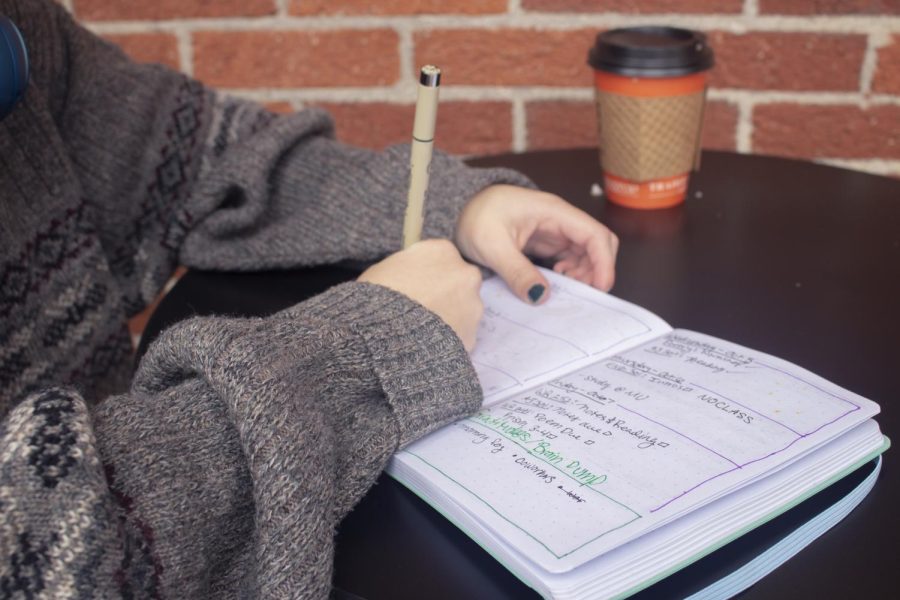Ten ways to reduce stress during midterm season
Sailor Tungkawachara, OMN Photographer
Gabriella Grinbergs, writer for Beaver’s Digest, writes in her notebook. With midterm season approaching, focusing on reducing stress is important.
Well, it’s that time of the term again: midterm season. Whether it’s exams, projects, essays or presentations, more often than not, it may feel like there’s too much to get done and not enough time – and the anxiety can build quickly. Here are some helpful ways to counter feelings of overwhelm and stress:
- Breathing exercises
There are countless different exercises designed to help clear the mind and calm down. One technique, according to WebMD, is called Breath Focus. First, relax your mind by visualizing something you find comforting. Then, breathe in and imagine the air as something relaxing, filling your chest. As you breathe out, visualize the stress and tension leaving with the air. This can help calm both the mind and body. Whenever you feel overwhelmed, taking a moment to ground yourself can be extremely helpful. - Stretching
Taking a minute to stretch is key in relieving stress throughout the body. Remaining in the same position for an extended period of time, such as sitting, can lead to a build up of tension in one’s muscles. Simply standing up and stretching your arms and legs can help promote blood flow and release tension in the body. More specific stretches, like a seated spinal twist or child’s pose, consist of simple motions that provide relief and take little time to complete, according to Everyday Health. - Short walks
Sometimes taking a few minutes to step away from your work can be the best way to handle stress. A short walk allows for time to think and clear the mind briefly before returning to work, according to a study published by North Dakota State University. Whether it’s up and down the stairs or around the block outside, taking a brief amount of time away from the assignments and study guides can improve one’s mood and provide a boost of motivation as well! - Keep a healthy routine
With all the assignments to complete and exams to study for, it can be easy to set aside our regular routines and fall into habits that increase anxiety, like skipping meals, not getting enough sleep and increasing caffeine intake. Having a balanced daily routine that incorporates moderate physical activity, at least eight hours of sleep, and nutritious eating habits helps to stay physically and mentally focused, according to Northwestern Medicine. - Clean space to study
While ensuring your body has what it needs to handle exam stress is important, it is equally as important to look after your mental health as well. One way to reduce the mental aspect of stress is keeping an organized study space, according to a research project from the University of Pittsburgh. Wherever you choose to study, whether it’s the library, your favorite cafe or in your own bedroom, maintaining a clear work space aids in focusing on the task at hand and prevents distraction. - Time management
Time management is a great skill to practice during exam season and helps to prevent multitasking and being overwhelmed. Planning ahead and prioritizing tasks with a planner or calendar can be used to organize your tasks and allow you to set aside distinct periods of time for studying and taking necessary breaks. Another time management tactic is learning what your limits are for commitments, according to an article from Amherst College. Overcommitting is an easy way to add unnecessary stress to an already overwhelming schedule, so learning to prioritize and say no can help avoid this. - Stay off cell phones
Aside from being a major distraction when studying, constantly checking your cell phone triggers a stress response in the nervous system. This reaction increases heart rate and tension in the muscles, both common symptoms of stress. Setting a screen time limit or turning off notifications are simple ways to avert this negative response as well as unnecessary distractions from your schoolwork, according to an article from the University of Colorado. - Meditating
With similar methods to breathing exercises, meditation is a great opportunity to briefly step away and ground yourself when feeling particularly overwhelmed. Meditating is a process, with various methods, that ultimately allows one to focus on breathing and clear a mind crowded by priorities and stressful thoughts, according to the Mayo Clinic. Meditating before, during, or after studying can help one carry on through the rest of the day more calmly, and with improved physical and emotional health – both of which are important for staying on task.
- Listen to music
Either before, during, or after studying, music is extremely helpful to focus and reduce stress. Both fast and slow paced music provides different benefits when studying – fast music improves mood, motivation, and alertness while slower music noise provides a soothing effect and aids concentration. But if music in general tends to be a distraction for you, ambient background noises, like rain, white noise or ocean wave sounds, might be a helpful replacement to put your mind at ease, according to an article from the University of Nevada, Reno. - Use positive affirmations
Finally, maintaining a positive mindset is of utmost importance to persevering through midterms and warding off stress. One way to pursue this is through positive affirmations and self talk. It could be as simple as writing an inspirational quote in your planner or having a list of mantras to repeat when feeling particularly stressed. Either way, having confidence in yourself and your abilities makes a world of difference between being overwhelmed by stress and keeping your cool through such a busy time of term, according to Mayo Clinic.
Was this article helpful?
YesNo










